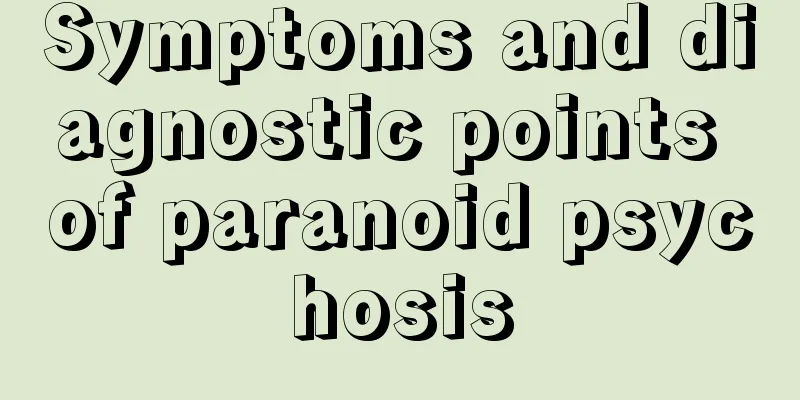Symptoms and diagnostic points of paranoid psychosis

|
You may not have heard of the term paranoid psychosis, but if you say it is delusion, you may understand it. Paranoid psychosis is a mental illness with very obvious symptoms. Doctors often determine the treatment and diagnosis plan based on the patient's symptoms to help patients control and treat the disease more effectively. 1. Symptoms of paranoid psychosis 1. The behavior and emotional responses of patients with paranoid psychosis are consistent with their delusional ideas, and their intelligence is well preserved. Common psychotic symptoms generally include paranoid delusions of varying severity and persistence, ranging from simply persistent feelings of involvement and victimization to delusions of influence, grandiosity, and jealousy. 2. Paranoid patients do not have hallucinations and ignore or do not believe objective evidence that is inconsistent with their thoughts. Being argumentative and hostile out of touch with reality, and stubbornly pursuing one's own irrational "rights" or interests. 3. Symptoms of paranoid psychosis include widespread suspicion, morbid jealousy, excessive vigilance and defensiveness. People with paranoid psychosis interpret things around them as a "conspiracy" that does not conform to reality and can become overvalued ideas. 2. Clinical Characteristics of Paranoid Psychosis (1) Paranoid psychosis often occurs in middle age, with an average age of about 40 to 50 years old, and there is no significant difference in the incidence rate between men and women. (2) There are often personality defects before the onset of the disease, such as paranoid personality or anxious avoidant personality. (3) Among blood relatives, the proportion of people with paranoid personality is relatively high. (4) Delusion is the most prominent mental symptom of this disease. (5) The delusion is not absurd or bizarre, but something that is likely to happen in real life. Some patients may require detailed investigation before being diagnosed with delusions. Common delusions include persecution delusions, erotomania, jealousy delusions, grandiose delusions and hypochondriasis delusions. (6) The delusion is characterized by one or a complete set of delusions, that is, systematic delusion. (7) The patient’s delusions are persistent, lasting at least several months, or even several years or a lifetime. (8) Affect, speech, and behavior are normal except for behaviors and attitudes directly related to the delusion or delusional system. (9) The disease course is chronic, and some patients relapse after remission. (10) Even if the disease lasts for a long time, there is no obvious decline in social adaptation function. III. Key points for diagnosis of paranoid psychosis (1) Delusion is the most prominent and only clinical feature. (2) The delusions are systematic and related to the real situation. (3) The delusions mainly include persecution, love, jealousy, exaggeration and hypochondria. (4) The disease lasts for more than 6 months. (5) No psychiatric symptoms related to delusions. (6) Social functions remain basically good |
<<: What vitamins are lacking in rotten feet and how to supplement them
>>: I wash my feet every day but they still stink, why is this?
Recommend
Are small lung nodules a sign of lung cancer? Not necessarily. There are many causes.
There are many reasons for the formation of pulmo...
Do I need to wear astigmatism glasses all the time?
Many people see double when they see things, and ...
What are the symptoms of advanced lymphoma
What are the symptoms of advanced lymphoma? Lymph...
The dangers of hamartoma that you don't know
Who is willing to go to the hospital in life? I b...
What should I do if white clothes turn yellow?
White is a color that many people like, and the c...
What are the symptoms of poor metabolic function
Everyone is more concerned about the problem of m...
How much do you know about the dangers of ovarian teratoma
This problem is of great concern to many female f...
What are the five items of thyroid function examination for?
Thyroid function test is a very important part of...
Indications and options for chemotherapy for gastric cancer
Gastric cancer has the highest incidence rate in ...
The following aspects should be noted in the prevention of lymphoma
Lymphoma is a common disease in life, and we shou...
What to do if a banana gets stuck in your throat?
Banana is a very popular fruit and is very popula...
What are the symptoms of advanced lung cancer? These are the common clinical symptoms of advanced lung cancer
There are many such examples in life. When a pers...
What is the cure rate for breast cancer without lymph node metastasis?
Breast cancer is usually divided into four stages...
What are some tips for removing stains from white clothes?
A pure white clothing can easily be stained if it...
What factors affect the incidence of pancreatic cancer
Pancreatic cancer is a malignant disease that thr...









